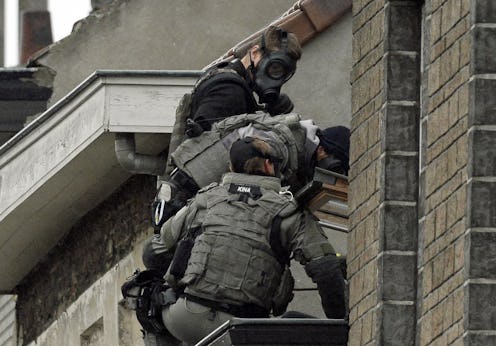News
Will Europe Pass Its Own Patriot Act?
Following the Sept. 11 terrorist attacks, Congress passed a sweeping overhaul of policies that allowed extensive electronic surveillance. A source of controversy ever since, the Patriot Act has been both lauded for thwarting attacks in their planning stages and criticized for allowing the National Security Agency to collect Americans' call records. Now, following the attacks in Paris on Friday, it seems that the EU and France may pass Patriot Act-like surveillance laws, bringing the debate between security and personal privacy to a head in Europe.
On Monday, a day after French air raids began to strike ISIS' stronghold Raqqa, French President Francois Hollande declared "France is at war" and called for sweeping changes to the country's constitution that would allow the government to take "exceptional" security measures. He said he would look to the courts for help in expanding surveillance and pass legislation allowing police and security forces to conduct raids on terrorists without a warrant. He also hopes to be able to take away French citizenship from any citizens who are convicted of terrorism and already hold another passport.
Meanwhile in Brussels, conservatives in the European Union parliament are pushing for legislation to share airline passenger information among its 28-member countries to identify terrorists. The Guardian also reports France will ask EU interior ministers on Friday to bolster shared borders by sending European border guards to the Greek-Turkish border. They want everyone entering Europe to be checked against databases for links with terrorism. Their demands for Europe also include more limits on weapon sales and cash transactions that could funnel money to terrorism.
Taken together, these policy proposals have much in common with the United States' Patriot Act. The law, passed in Oct. 2011, less than two months after 9/11, allowed for many of these same measures. The Patriot Act increased the tools of surveillance available to law enforcement, taking new technology into account, and it allowed the government to delay telling potential terrorists that they were under a search warrant, allowing police and intelligence agencies to investigate without tipping off the suspects. In lesser scrutinized sections, it also increased border security and focused on potential money laundering to fund terrorism.
Given the past criticism of the Patriot Act by Europeans, the similarities are striking. Edward Snowden's NSA leaks in 2013, revealed that the the surveillance agency monitored transmissions between various data centers of internet giants, among them Yahoo and Google. Last month, the European Court of Justice struck down an agreement that allowed European citizens' data to be moved to the United States out of fear that their information would land in the hands of the NSA. The potential surveillance, the court found, violated Europeans' privacy rights.
After the Charlie Hebdo attacks in Paris, France took similar moves to broaden its surveillance abilities. In May, a law passed in the French parliament that allowed broad domestic surveillance with little judicial oversight. The law forces Internet companies to permit the government to look through all of their customers' communications. It allowed for the large collection of data that the NSA came under fire for. Immediately after the attack, the idea of such a law was ridiculed in France. In July, Amnesty International called the law "a major blow to human rights" in the country. More than 82 percent of French citizens found the United States' surveillance of its citizens unacceptable, according to a 2014 Pew Global Attitudes survey. They likely would feel the same way about being spied on by their own government.
The Patriot Act has also been controversial in the United States. The Obama Administration faced pushback when trying to renew it for the second time this spring. It even expired for a day at the beginning of June before Congress passed the Freedom Act, which renewed much of the Patriot Act while limiting bulk data collection by the NSA. That pushback, though, came nearly 14 years after the Sept. 11 attacks. Even this year, 61 percent of Americans supported its renewal, even though many would like further limits on phone and Internet data the government can collect from them.
Whether France and Europe can find a balance between security and personal privacy will be decided in the weeks to come. If America's experience after a large-scale terrorist attack is any guide, the balance will likely shift in favor of security.
